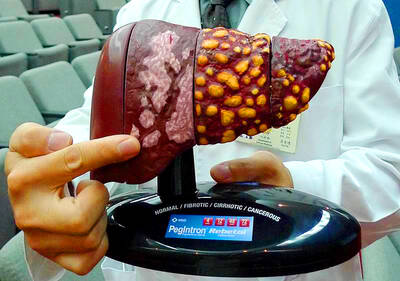Both the Central Election Commission (CEC) and Ministry of the Interior yesterday retracted remarks by officials that the question to be asked in a proposed referendum on whether to complete construction of the Fourth Nuclear Power Plant should be one that would alter the “status quo” if voters approve it.
Amid heated discussion of the referendum proposed by Premier Jiang Yi-huah (江宜樺), Central Election Commission secretary-general Teng Tien-yu (鄧天祐) and Department of Civil Affairs director-general Huang Li-hsin (黃麗馨) triggered controversy when they were quoted by the Chinese-language United Daily News as saying yesterday that the question asked in the referendum should be one that would change the “status quo” if voters approve it.
The heads of both government agencies later played down the comments.
“Which question is asked or how the question is worded in a referendum proposal has nothing to do with the CEC, especially if a referendum is proposed by the legislature. Our job is to accept it and organize the referendum,” Central Election Commission Chairwoman Chang Po-ya (張博雅) said. “We are not involved [in deciding the question].”
She said that according to the Referendum Act (公民投票法), only referendums proposed by individuals, non-governmental organizations or political parties have to receive approval from the Referendum Review Committee before making it to polling stations.
“A referendum proposed by the legislature would automatically be valid without having to go through the review process,” she said.
The Chinese Nationalist Party (KMT) legislative caucus plans to take the initiative and propose the referendum in the legislature.
Minister of the Interior Lee Hong-yuan (李鴻源) made a similar remarks in the legislature yesterday.
“The ministry only deals with the administration of organizing a referendum; discussions on the question asked is the job of the Executive Yuan or the Legislative Yuan,” Lee said. “Of course, I have my own personal view on it, but I would rather not say what it is because it’s not the ministry’s business.”
Although the question has not been finalized, the KMT favors: “Do you support halting construction of the Fourth Nuclear Power Plant?” while the Democratic Progressive Party and several anti-nuclear groups prefer the question: “Do you agree that the construction of the Fourth Nuclear Power Plant should continue?”

Aftershocks from a magnitude 6.2 earthquake that struck off Yilan County at 3:45pm yesterday could reach a magnitude of 5 to 5.5, the Central Weather Administration (CWA) said. Seismological Center technical officer Chiu Chun-ta (邱俊達) told a news conference that the epicenter of the temblor was more than 100km from Taiwan. Although predicted to measure between magnitude 5 and 5.5, the aftershocks would reach an intensity of 1 on Taiwan’s 7-tier scale, which gauges the actual effect of an earthquake, he said. The earthquake lasted longer in Taipei because the city is in a basin, he said. The quake’s epicenter was about 128.9km east-southeast

The Taipei Summer Festival is to begin tomorrow at Dadaocheng Wharf (大稻埕), featuring four themed firework shows and five live music performances throughout the month, the Taipei Department of Information and Tourism said today. The festival in the city’s Datong District (大同) is to run until Aug. 30, holding firework displays on Wednesdays and the final Saturday of the event. The first show is scheduled for tomorrow, followed by Aug. 13, 20 and 30. To celebrate the 30th anniversary of Disney Pixar's movie Toy Story, the festival has partnered with Walt Disney Co (Taiwan) to host a special themed area on

BE CAREFUL: The virus rarely causes severe illness or death, but newborns, older people and those with medical conditions are at risk of more severe illness As more than 7,000 cases of chikungunya fever have been reported in China’s Guangdong Province this year, including 2,892 new cases last week, the Centers for Disease Control (CDC) yesterday said it is monitoring the situation and considering raising the travel notice level, which might be announced today. The CDC issued a level 1 travel notice, or “watch,” for Guangdong Province on July 22, citing an outbreak in Foshan, a manufacturing hub in the south of the province, that was reported early last month. Between July 27 and Saturday, the province reported 2,892 new cases of chikungunya, reaching a total of 7,716

STAY VIGILANT: People should reduce the risk of chronic liver inflammation by avoiding excessive alcohol consumption, smoking and eating pickled foods, the physician said A doctor last week urged people to look for five key warning signs of acute liver failure after popular producer-turned-entertainer Shen Yu-lin (沈玉琳) was reportedly admitted to an intensive care unit for fulminant hepatitis. Fulminant hepatitis is the rapid and massive death of liver cells, impairing the organ’s detoxification, metabolic, protein synthesis and bile production functions, which if left untreated has a mortality rate as high as 80 percent, according to the Web site of Advancing Clinical Treatment of Liver Disease, an international organization focused on liver disease prevention and treatment. People with hepatitis B or C are at higher risk of